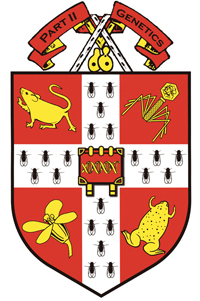
Main Course Components
The course is organised into 5 modules from which you select 4, ensuring that you acquire the necessary breadth of background in the subject. Each module is made up of ~24 lectures. The modules aim to cover the range of genetics from cellular to organism level and will show how the latest developments (in areas such as sequencing technologies and genome assembly, functional and computational biology) are being applied to the problems of how genes in different species are organised, expressed and interact, to give the final phenotype.
Michaelmas Term (2/2) – no options:
- Module 1: Genomes (M)
- Module 2: Early Development & Patterning: Genetic & Cellular Mechanisms (M)
Lent Term (2/3) – you select 2 modules out of:
- Module 3: Genetics of Health & Disease (L)
- Module 4: Evolutionary Genetics & Adaptation (L)
- Module 5: Mathematical Genetics (L)
[Outlines of the content of each module can be found on a separate page]
Each module has additional sessions, where students work in groups:
- Journal paper analysis sessions
- Problem solving / data handling sessions
- Lecturers schedule supervisions, to help consolidate information taught in each Module
Extras
Social Aspects of Genetics [SAG] discussions, often organised by visiting scientists, allow students to tackle issues such as on GMOs, antibiotic resistance, medical ethics and genome editing.
Talks on, or practical sessions in, 'supporting' subjects such as:
- Applying for a PhD and careers in general
- Study skills
- Statistics
- Bioinformatics & computational tools
- Library resources and bibliographic databases
Part IIs also attend two series of research seminars:
- Thursday Departmental seminar programme where external speakers talk about their work
- Tuesday lunchtime series in which Departmental PhD students outline their research
[Titles for these talks display as feeds on the home page of this site, and can be found on relevant internal pages and emailing lists.]
Coursework
A project, hosted by one of the Department’s research groups, is undertaken during the Lent Term. This can be either a lab 'wet' project, or a 'dry' project. The results of your project are written up in a report, you also undertake a related literature review, and you present your findings to the class. See recent examples of projects offered here. You can find out more about research in the Department via the listing of labs.
Exams and Final Marks
- Four three-hour papers (each mapping to one module) (64%)
- One two-hour paper (a mix of broad-based questions, designed to test your ability to integrate knowledge from across the course as a whole) (10%)
- Literature review and research project (26%).
For the programme specification, admission requirements and assessment: Part II Genetics go to: https://www.natsci.tripos.cam.ac.uk/subject-information/part2/gen
More information on the Part II BBS option is available here.
Other Useful Links
- Part II marking/ classing criteria, for students and staff, from the Faculty of Biology - https://www.biology.cam.ac.uk/exams [Raven access only]
- Cambridge University's guidance on good academic practice and plagiarism can be found at found at: http://www.admin.cam.ac.uk/univ/plagiarism/
Enquiries about the Part II Genetics Course should be the course administrator at ugadm@gen.cam.ac.uk
Page updated 31/07/2025

